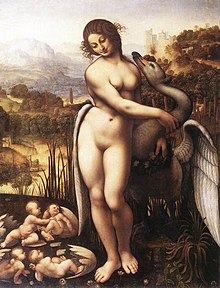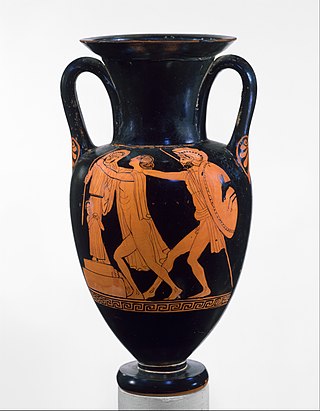
Cassandra or Kassandra in Greek mythology was a Trojan priestess dedicated to the god Apollo and fated by him to utter true prophecies but never to be believed. In modern usage her name is employed as a rhetorical device to indicate a person whose accurate prophecies, generally of impending disaster, are not believed.

The Judgement of Paris is a story from Greek mythology, which was one of the events that led up to the Trojan War, and in later versions to the foundation of Rome.

The Trojan War was a legendary conflict in Greek mythology that took place around the 12th or 13th century BCE. The war was waged by the Achaeans (Greeks) against the city of Troy after Paris of Troy took Helen from her husband Menelaus, king of Sparta. The war is one of the most important events in Greek mythology, and it has been narrated through many works of Greek literature, most notably Homer's Iliad. The core of the Iliad describes a period of four days and two nights in the tenth year of the decade-long siege of Troy; the Odyssey describes the journey home of Odysseus, one of the war's heroes. Other parts of the war are described in a cycle of epic poems, which have survived through fragments. Episodes from the war provided material for Greek tragedy and other works of Greek literature, and for Roman poets including Virgil and Ovid.
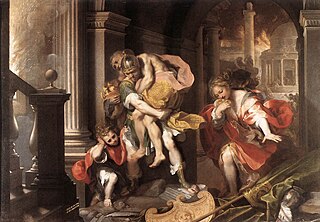
The Aeneid is a Latin epic poem that tells the legendary story of Aeneas, a Trojan who fled the fall of Troy and travelled to Italy, where he became the ancestor of the Romans. Written by the Roman poet Virgil between 29 and 19 BC, the Aeneid comprises 9,896 lines in dactylic hexameter. The first six of the poem's twelve books tell the story of Aeneas' wanderings from Troy to Italy, and the poem's second half tells of the Trojans' ultimately victorious war upon the Latins, under whose name Aeneas and his Trojan followers are destined to be subsumed.

Castor and Pollux are twin half-brothers in Greek and Roman mythology, known together as the Dioscuri or Dioskouroi.
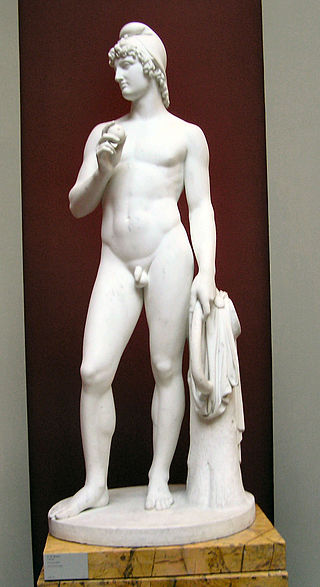
Paris, also known as Alexander, is a mythological figure in the story of the Trojan War. He appears in numerous Greek legends and works of Ancient Greek literature such as the Iliad. In myth, he is prince of Troy, son of King Priam and Queen Hecuba, and younger brother of Prince Hector. His elopement with Helen sparks the Trojan War, during which he fatally wounds Achilles.

Helen, also known as Helen of Troy, in Latin as Helena, beautiful Helen, Helen of Argos, or Helen of Sparta, was a figure in Greek mythology said to have been the most beautiful woman in the world. She was believed to have been the daughter of Zeus and Leda, and was the sister of Clytemnestra, Castor and Pollux, Philonoe, Phoebe and Timandra. She was married to King Menelaus of Sparta "who became by her the father of Hermione, and, according to others, of Nicostratus also." Her abduction by Paris of Troy was the most immediate cause of the Trojan War.

In Greek mythology, Teucer, also Teucrus, Teucros or Teucris, was the son of King Telamon of Salamis Island and his second wife Hesione, daughter of King Laomedon of Troy. He fought alongside his half-brother, Ajax, in the Trojan War and is the legendary founder of the city of Salamis on Cyprus. Through his mother, Teucer was the nephew of King Priam of Troy and the cousin of Hector and Paris—all of whom he fought against in the Trojan War.
In Greek mythology, Tyndareus was a Spartan king.
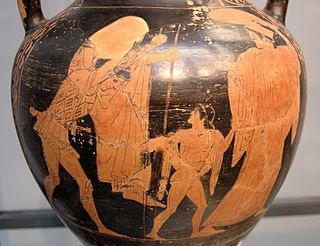
Ascanius was a legendary king of Alba Longa and is the son of the Trojan hero Aeneas and Creusa, daughter of Priam. He is a character in Roman mythology, and has a divine lineage, being the son of Aeneas, who is the son of the goddess Venus and the hero Anchises, a relative of the king Priam; thus Ascanius has divine ascendents by both parents, being descendants of god Jupiter and Dardanus. He is also an ancestor of Romulus, Remus and the Gens Julia. Together with his father, he is a major character in Virgil's Aeneid, and he is depicted as one of the founders of the Roman race.

In ancient Greek religion and myth, Nemesis also called Rhamnousia, was the goddess who personified retribution for the sin of hubris; arrogance before the gods.
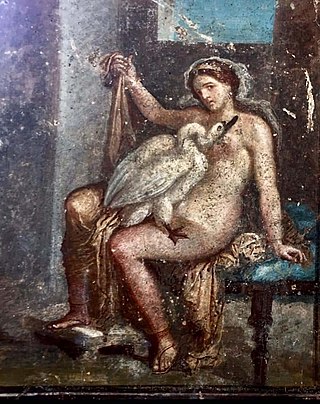
In Greek mythology, Leda was an Aetolian princess who became a Spartan queen. According to Ovid, she was famed for her beautiful black hair and snowy skin. Her myth gave rise to the popular motif in Renaissance and later art of Leda and the Swan.
A narrative work beginning in medias res opens in the midst of the plot. Often, exposition is bypassed and filled in gradually, through dialogue, flashbacks or description of past events. For example, Hamlet begins after the death of Hamlet's father. Characters make reference to King Hamlet's death without the plot's first establishment of said fact. Since the play is about Hamlet and the revenge more so than the motivation, Shakespeare uses in medias res to bypass superfluous exposition.

Helen is a drama by Euripides about Helen, first produced in 412 BC for the Dionysia in a trilogy that also contained Euripides' lost Andromeda. The play has much in common with Iphigenia in Tauris, which is believed to have been performed around the same time period.

Troilus is a legendary character associated with the story of the Trojan War. The first surviving reference to him is in Homer's Iliad, composed in the late 8th century BCE.

"Ars Poetica", or "The Art of Poetry", is a poem written by Horace c. 19 BC, in which he advises poets on the art of writing poetry and drama. The Ars Poetica has "exercised a great influence in later ages on European literature, notably on French drama", and has inspired poets and authors since it was written. Although it has been well-known since the Middle Ages, it has been used in literary criticism since the Renaissance.

Ovo vegetarianism is a type of vegetarianism which allows for the consumption of eggs but not dairy products, in contrast with lacto vegetarianism. Those who practice ovo vegetarianism are called ovo-vegetarians. "Ovo" comes from the Latin word for egg.

Clytemnestra, in Greek mythology, was the wife of Agamemnon, king of Mycenae, and the half-sister of Helen of Troy. In Aeschylus' Oresteia, she murders Agamemnon – said by Euripides to be her second husband – and the Trojan princess Cassandra, whom Agamemnon had taken as a war prize following the sack of Troy; however, in Homer's Odyssey, her role in Agamemnon's death is unclear and her character is significantly more subdued.
Timeō Danaōs et dōna ferentēs, paraphrased in English as "I fear the Greeks even when bearing gifts", is a Latin phrase from Aeneid, a Latin epic poem written by Virgil. The phrase is spoken by Trojan priest Laocoön referring to the Trojan Horse used by the Greeks during the Trojan War. The literal meaning of the phrase is "I fear the Danaans [Greeks], even those bearing gifts" or "even when they bear gifts". Most printed versions of the text have the variant ferentis instead of ferentes. In modern English, it is used as a proverb to warn against trusting an enemy or adversary, even when they appear to be making an enticing offer.
Ab initio is a Latin term meaning "from the beginning" and is derived from the Latin ab ("from") + initio, ablative singular of initium ("beginning").
